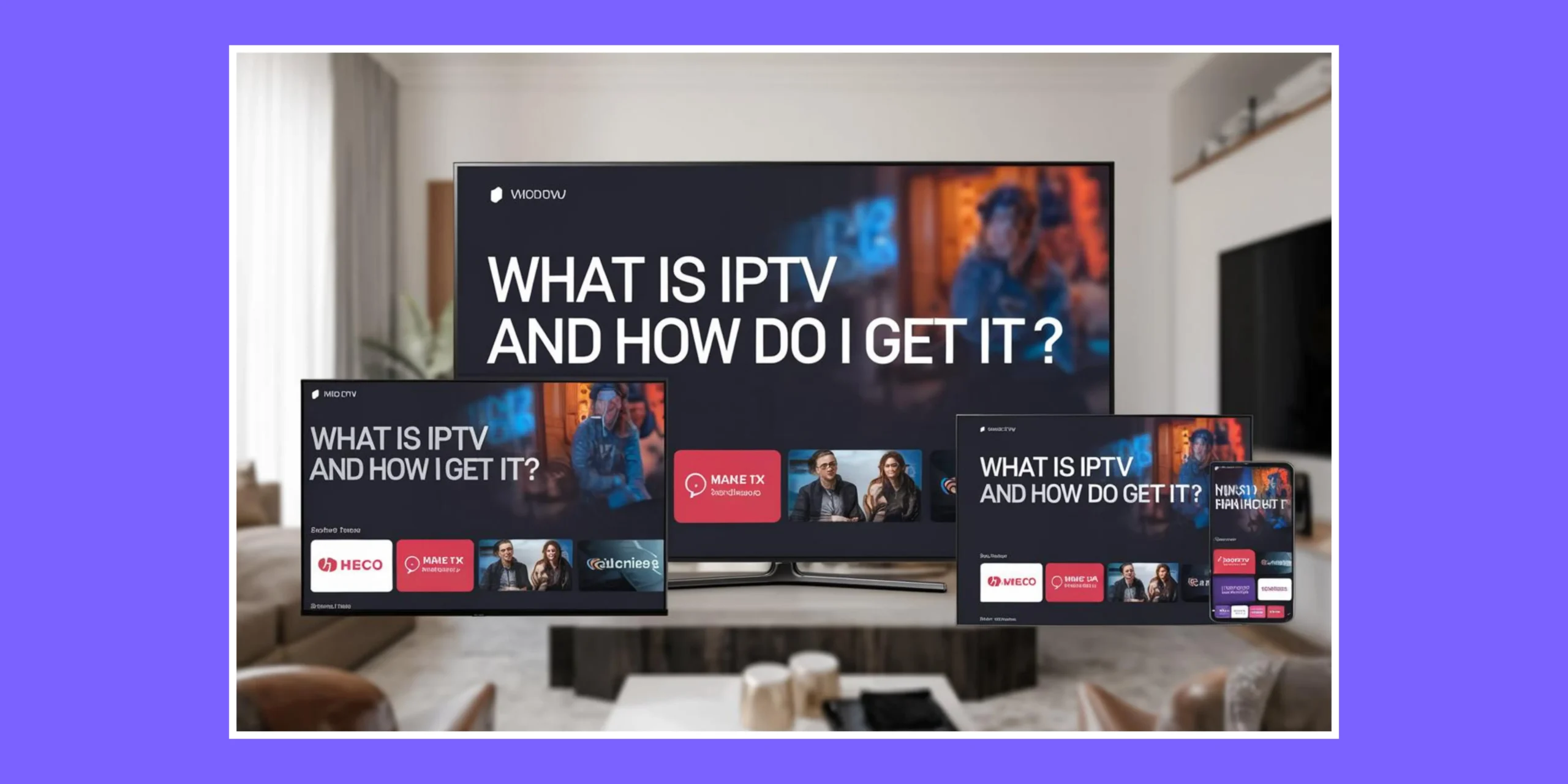
What is IPTV and How Do i Get it: Best Comprehensive Guide 2024
Table of Contents
Introduction
what is iptv and how do i get it ? : In today’s digital age, the way we consume television is evolving rapidly, moving away from traditional cable and satellite services toward more advanced technology solutions. One such technology is Internet Protocol Television (IPTV), which has been gaining traction due to its flexibility, affordability, and personalized content delivery. This blog post aims to explain everything you need to know about IPTV: from what it exactly is, how it works, to how you can get it set up in your own home. Whether you’re a tech enthusiast looking to switch from traditional TV services or someone new to this technology, our guide will provide you with all the necessary details to understand and start using IPTV effectively.
What is IPTV?
Defining IPTV
Internet Protocol Television (IPTV) is a digital TV broadcasting technology that delivers television content over the internet, rather than through traditional terrestrial, satellite signal, or cable television formats. This means that instead of being limited to broadcasting times and linear programming, IPTV allows users to stream their favorite shows and channels directly via their internet connection. IPTV can be classified as a system that provides digital television services to subscribers through Internet protocol technology using broadband or internet links.
How IPTV Works
The technology behind IPTV is quite complex but can be simplified for a better understanding. IPTV involves sending information and TV channels over the internet by turning data (such as a video file) into packets that are transmitted over an IP network and then converted back into video images on the viewer’s device. This allows for features such as video on demand, which is not possible with traditional TV formats.
Types of IPTV Services
IPTV offers a variety of services that enhance the viewer’s experience:
- Video on Demand (VoD): Allows users to select and watch video content whenever they wish, rather than at a scheduled broadcast time.
- Time-shifted media: Sometimes known as catch-up TV, this allows users to view broadcast content at a time more convenient for them, rather than when it was originally aired.
- Live IPTV: Similar to live TV broadcasts, this service streams live events and television programs as they happen.
Table: Comparison of IPTV Services
| Service Type | Description | Examples |
|---|
| Video on Demand | Watch videos anytime | Netflix, Hulu |
| Time-shifted Media | Watch past broadcasted content | BBC iPlayer, Sling TV |
| Live IPTV | Live streaming of events and programs | Watching live sports or news |
IPTV’s flexibility and the ability to integrate with other IP-based services such as high-speed internet and voice over IP (VoIP) have significantly changed how people consume media, making it a powerful alternative to conventional broadcasting methods.
The Benefits of Switching to IPTV
Customization and Flexibility
One of the primary advantages of IPTV is the unparalleled level of customization and flexibility it offers to viewers. Unlike traditional TV that broadcasts content on a fixed schedule, IPTV allows users to watch their favorite shows and channels whenever they want. This flexibility is enhanced by features like pause, rewind, and fast-forward, which are not typically available with live television broadcasts.
- Personalized Viewing: IPTV providers often offer services that allow users to customize their viewing experience, such as creating personal profiles, which tailor the viewing recommendations based on past behaviors.
Cost-Effectiveness
Switching to IPTV can also be financially advantageous. Many consumers find that IPTV subscriptions are more affordable than traditional cable or satellite services, especially when factoring in the ability to subscribe only to specific channels rather than entire packages.
- Subscription Flexibility: IPTV may offer the ability to pay only for the channels you watch or for specific shows, potentially lowering your monthly entertainment budget.
Accessibility and Multi-Device Use
IPTV shines in its ability to be accessed across various devices, which means you can enjoy your content at home on your TV or on the go with your smartphone or tablet. This multi-device compatibility is a significant advantage for users who prefer to watch their content in different settings or while traveling.
- Supported Devices: Smart TVs, computers, smartphones, tablets, and even gaming consoles can all access IPTV services, providing a seamless viewing experience from anywhere with an internet connection.
Table: Benefits of Switching to IPTV
| Benefit | Description |
|---|
| Customization | Tailored content recommendations and flexible viewing options. |
| Cost Savings | More affordable than traditional TV services with flexible subscription options. |
| Accessibility | Access content on any internet-enabled device, anywhere. |
These benefits collectively make IPTV a compelling choice for modern consumers looking for more control over what, when, and how they watch television. The transition to IPTV not only caters to the need for convenience and customization but also aligns with the ongoing shift towards more digitally integrated lifestyles.
What Do You Need to Start Using IPTV?
Internet Requirements
The backbone of IPTV is a reliable and high-speed internet connection. Since IPTV streams video content over the internet, having a stable connection is crucial to avoid buffering and ensure smooth playback. Generally, a broadband connection with a minimum speed of 10 Mbps is recommended for standard definition content, while HD and UHD content may require speeds of 25 Mbps or more.
- Internet Speed Tips: To enhance your IPTV experience, consider using a wired connection (Ethernet) rather than Wi-Fi for more stable speeds and connect directly to your modem or router if possible.
Necessary Equipment
To access IPTV services, you will need compatible hardware. Here are the primary devices you might use:
- Smart TVs: Many newer TVs come with built-in IPTV capabilities and apps.
- Set-top Boxes and Streaming Devices: Devices like Amazon Fire Stick, Roku, or Apple TV can turn any regular TV into a smart TV capable of streaming IPTV.
- Computers and Mobile Devices: PCs, laptops, tablets, and smartphones can all access IPTV through various applications and software.
Table: Essential IPTV Equipment
| Device Type | Purpose | Examples |
|---|
| Smart TV | Direct IPTV app support | Samsung Smart TV, LG WebOS TV |
| Set-top Box/Streamer | Converts TVs to smart TVs, supports IPTV apps | Roku, Amazon Fire Stick |
| Computers & Mobiles | Access IPTV via software or apps | VLC Media Player, IPTV Smarters |
Choosing an IPTV Provider
Selecting the right IPTV provider is crucial as it impacts the type of content available to you and the quality of the service. Consider the following when choosing a provider:
- Content Offerings: Ensure the provider offers the type of content you enjoy, whether it’s sports, international channels, or premium movie channels.
- Service Quality: Look for reviews or ask for recommendations to gauge the reliability and quality of the service.
- Pricing and Contracts: Compare costs between different providers and check if there are any contractual obligations or hidden fees.
Tips for Choosing an IPTV Provider:
- Research and compare several IPTV providers to find the best fit for your needs.
- Consider starting with a trial period if available to test the service before committing to a subscription.
Step-by-Step Guide on How to Get IPTV
Getting started with IPTV involves a few straightforward steps. Here’s a detailed guide to help you set up and enjoy IPTV services at home:
How to Choose the Right IPTV Service
Choosing the right IPTV provider is essential for a good viewing experience. Here are key factors to consider:
- Content Variety: Ensure the provider offers a broad range of channels and content types that suit your interests.
- Quality of Service: Look for providers known for reliable streaming and good customer support.
- Pricing Structure: Compare the cost against the features and channel lineup. Check for any hidden fees or required add-ons.
Setting Up Your IPTV
Once you have chosen your IPTV provider, setting up the service is generally simple:
Subscribe to the Service:
- Sign up through the provider’s website or over the phone.
- Complete the registration process and choose your package.
- Make note of any login credentials provided.
Installing IPTV Software/App:
- On Smart TVs: Download the IPTV app from your TV’s app store.
- On Set-top Boxes/Streaming Devices: Install the IPTV application through the device’s dedicated app store.
- On Computers and Mobile Devices: Download and install IPTV software or apps like VLC Media Player for PCs or IPTV Smarters for mobile devices.
Connect to Your Network:
- Ensure your device is connected to the internet via Wi-Fi or a direct Ethernet connection for the best stability.
Enter Your Subscription Details:
- Open the IPTV app or software and log in using the credentials you received from your provider.
Start Streaming:
- Navigate through the channel list or library offered by your IPTV service and begin watching your favorite shows.
Tips for Optimizing Your IPTV Experience
- Enhance Your Internet Connection: If possible, upgrade your internet plan to a higher speed or improve your home network with a better router to handle high-definition streaming smoothly.
- Use a Wired Connection: Connect your IPTV device directly to the router using an Ethernet cable to minimize streaming issues often caused by weak wireless signals.
Troubleshooting Common IPTV Issues
- Buffering or Freezing: Check your internet speed and router settings. Restart your device and router if problems persist.
- Login Issues: Verify your subscription details and ensure your account is active. Contact customer support if you cannot resolve the issue.
- Quality Problems: Adjust the stream quality settings within the app to match your internet speed or consult with your provider for technical support.
Common Questions About IPTV
As IPTV grows in popularity, it naturally raises several questions among potential and current users. Here’s a detailed look at some frequently asked questions to help clarify common concerns and provide useful insights:
Is IPTV Legal?
- Understanding Legality: IPTV itself is a legal technology, similar to internet services. However, the legality of specific IPTV services depends on whether the provider has the proper licensing for the content they offer. Always ensure that the service you subscribe to complies with local copyright laws to avoid legal issues.
- Avoiding Illicit Services: Be wary of providers offering unusually cheap services or access to typically expensive content at a low cost, as these may be operating without proper licenses.
Can I Use IPTV on Multiple Devices?
- Device Compatibility: Most IPTV services allow you to stream content on multiple devices, but this can vary depending on the provider’s package. Check the terms of service to understand how many simultaneous streams are allowed.
- Managing Devices: Some services may offer a management platform where you can add or remove devices associated with your account, ensuring flexibility across different devices like smartphones, tablets, and TVs.
What to Do if You Experience Issues with IPTV
- Basic Troubleshooting: Start by checking your internet connection and rebooting your device. Ensure that your subscription is active and that there are no service outages reported by your provider.
- Technical Support: If issues persist, contact your IPTV provider’s customer support for assistance. Keep handy any relevant account information to expedite the support process.
Table: Quick Troubleshooting Tips for Common IPTV Issues
| Issue Type | Possible Cause | Quick Fix |
|---|
| Buffering | Slow internet speed | Check internet connection, try restarting the router. |
| Login Problems | Incorrect credentials | Double-check login details, reset password if necessary. |
| Poor Video Quality | Low bandwidth or incorrect settings | Adjust video settings, upgrade internet plan if persistent. |
These FAQs aim to address the primary concerns users may have about IPTV, providing them with the confidence to navigate their IPTV usage more effectively.
Future of IPTV
As technology continues to evolve, so does the landscape of IPTV, promising exciting advancements and broader adoption in the future. Here’s what you can expect from the evolution of IPTV:
Trends in IPTV Technology
- Integration with Emerging Technologies: IPTV is set to benefit greatly from advancements in areas like 5G, artificial intelligence (AI), and machine learning. These technologies will enhance streaming quality, reduce buffering times, and improve content recommendation systems, making IPTV even more responsive and user-friendly.
- Augmented and Virtual Reality: As AR and VR technologies mature, IPTV providers may begin incorporating these elements into their services to offer immersive viewing experiences, particularly in sports and live events.
Predicting the Growth of IPTV
- Market Expansion: The global IPTV market is expected to grow significantly as more consumers move away from traditional television services towards more flexible and feature-rich IPTV solutions.
- Regulatory Developments: As the market expands, regulatory frameworks will likely evolve to better define and support the legal distribution of content via IPTV, ensuring a fair environment for providers and protect consumers.
Quote from Industry Expert:
“The future of television is inherently tied to the internet, and IPTV is at the forefront of this transformation. With each technological leap, IPTV is set to become even more ingrained in our daily lives.” – Dr. Emily Robertson, Media Technology Analyst
Impact of 5G on IPTV
- Enhanced Connectivity: The rollout of 5G technology promises to significantly boost IPTV services by providing ultra-high-speed internet connections and lower latency, ideal for high-definition and ultra-high-definition streaming.
- Broader Accessibility: With 5G, IPTV could reach rural and remote areas, offering quality streaming services without the need for traditional broadband infrastructure.
Table: Potential Benefits of 5G for IPTV
| Benefit | Description |
|---|
| Faster Speeds | Supports higher resolutions and faster loading times. |
| Reduced Latency | Improves the responsiveness of live streaming services. |
| Expanded Coverage | Enables consistent IPTV quality across broader areas. |
The future of IPTV is not just about more content or more subscribers; it’s about creating a richer, more interactive, and seamless viewing experience that leverages the latest technological innovations.
Conclusion
The shift from traditional broadcasting to Internet Protocol Television (IPTV) represents a significant evolution in the way we consume news and entertainment. With its ability to offer on-demand, personalized news content, IPTV caters to the modern viewer’s demands for flexibility and interactivity. Technological advancements in IPTV have enhanced the viewing experience, providing high-definition streams and innovative features that promote viewer engagement. As IPTV continues to grow, it will likely become an increasingly common platform for news consumption, challenging traditional media’s role in our daily lives.
The future of IPTV is promising, driven by advancements like 5G technology and artificial intelligence, which will further improve the efficiency and quality of news broadcasts. However, navigating the complex landscape of regulations and ensuring the security of viewer data remain pivotal for the sustained growth of IPTV services.
Call to Action
Are you ready to experience the future of news? Embrace the cutting-edge world of IPTV news today. Start by choosing a reliable IPTV provider and explore the vast array of news channels available at your fingertips. Whether you’re interested in global events or local news, IPTV offers a tailored viewing experience that adapts to your lifestyle and preferences.
Engage with the technology that is reshaping the media landscape. Try IPTV and see for yourself how it transforms your news consumption habits. Share your experiences and thoughts in the comments below or on social media. How has IPTV changed the way you view the world?
FAQs About IPTV
As IPTV grows in popularity, it naturally raises several questions among potential and current users. Here’s a detailed look at some frequently asked questions to help clarify common concerns and provide useful insights:
Is IPTV legal?
Internet Protocol Television (IPTV) itself is a legal technology, similar to internet services. However, the legality of specific IPTV services depends on whether the provider has the proper licensing for the content they offer. Always ensure that the service you subscribe to complies with local copyright laws to avoid legal issues.
Can I watch IPTV on multiple devices?
Most IPTV services allow you to stream content on multiple devices, but this can vary depending on the provider’s package. Check the terms of service to understand how many simultaneous streams are allowed.
What to do if you experience issues with IPTV?
Start by checking your internet connection and rebooting your device. Ensure that your subscription is active and that there are no service outages reported by your provider. If issues persist, contact your IPTV provider’s customer support for assistance.
How does IPTV differ from streaming services like Netflix?
IPTV can offer live television programming, which is not typically available on demand-only streaming platforms like Netflix. Additionally, IPTV services may provide a broader range of localized television channels.
Can IPTV replace traditional cable?
For many users, IPTV offers a viable alternative to traditional cable, especially as it often provides similar or better services at a lower cost. However, the suitability can depend on the user’s specific viewing preferences and the quality of their internet connection.
Additional Resources and Links
- IPTV Beginners Guide (PDF): A comprehensive guide to understanding and getting started with IPTV.
- Choosing the Right IPTV Provider (Blog Post): Tips and considerations when selecting an IPTV service provider.
- Legal Aspects of IPTV (Article): An article discussing the legal considerations and compliance required for IPTV services.
- IPTV and 5G: The Future of Broadcasting (Video): A video presentation on how 5G technology will impact IPTV services.
- How to Optimize Your Internet for IPTV (Tutorial): Step-by-step instructions on optimizing your internet connection for the best IPTV experience.
These FAQs and additional resources aim to enhance understanding and support for new or prospective IPTV users, providing essential insights into the platform’s operation, legality, and technical requirements.




